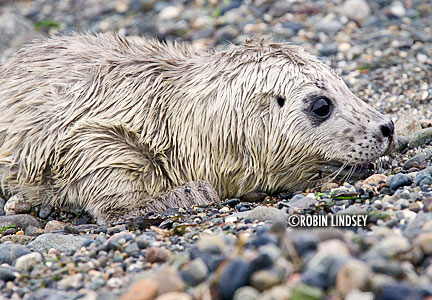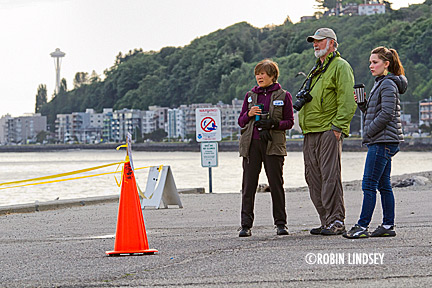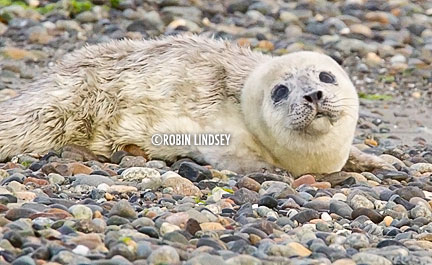Heartbreak as premature seal pup born along Alki Beach
Jun/11/14 06:51 AM

Within minutes, Seal Sitters first responder David and volunteer Eilene were on the scene attempting to establish a protective perimeter with tape and cones, asking people to please stand back. A man with a leashed dog illegally on the beach not only refused to leave the sand, but insisted that it was his right “as a taxpayer” to continue his path past the pup. Apparently, this taxpayer felt it was also his right to break municipal law by having his dog on a Seattle public beach - where dogs are not allowed leashed or unleashed. He finally left after an intense verbal exchange. Another dog owner was nearby throwing a ball into the Sound for his off-leash dog to fetch. We cannot stress enough that dogs are unpredictable and a documented danger to seal pups, causing injury and death to pups in Washington State each year. This was not a good start to our first response of the 2014 seal pupping season.
It was obvious that the surf-soaked pup was a newborn because of the bright flesh-colored umbilicus cord dangling from the pup’s belly. Her body was covered with a long, wavy white lanugo coat (photo above), an indication she was born a month prematurely. A full-term pup will shed this fluffy coat in the womb. We knew this was going to be a difficult situation for both the pup and Seal Sitters, who must try to keep this busy beach area quiet enough that mom might feel safe enough to return for her newborn, who could not survive without her.

Seal Sitters volunteers tried to keep a low profile at the far ends of the yellow tape boundary, explaining to sympathetic and cooperative onlookers that this pup was believed to have been born that very day. Huge thanks to WDFW marine mammal biologist Dyanna Lambourn for her review of our photos and consultation as to pup’s age and condition.
The pup, nicknamed Luigi, was observed by volunteers throughout the day and discreetly during the dark of night and wee hours of the morning. It was crucial to know if an attending mom would return - no mom ever appeared to our knowledge. During the early morning hours the thin pup moved a bit further up the beach and at first light, the perimeter was adjusted to protect her in what was anticipated to be a warm, and therefore, very crowded day at Alki. Shown in the photo at sunrise with Seattle’s iconic Space Needle in the background are first responder Lynn, science and education advisor Buzz and new volunteer Savanna.
By early afternoon, it became increasingly likely that for unknown reasons, the pup was abandoned with no attending female who would care for this tiny pup. We have no idea what the circumstances surrounding the birth were. Was Luigi born on Alki and mom was scared back into the water by people or dogs before bonding with her pup? Did she give birth just offshore because the beach was busy, but the pup made it to shore alone? Did she die during the birth? If anyone witnessed an adult onshore or very close to shore, perhaps in distress, along Alki Beach Monday afternoon, please contact us. We do know that this pup was too tiny and weak to have swum any substantial distance after birth.

Premature pups - especially one born a month early - rarely survive the lengthy rehab process. If they manage to stabilize for the short term, too often it is only to die shortly after. Nature can be harsh. About 90% of lanugo pups born in the wild don’t survive - and most of those are partial lanugos, not a full month premature. Lanugos require much more maternal care than a full-term pup and some less experienced moms will make the decision to abandon a premature pup whose lungs and muscles may not be fully developed, plus any other factors that may have contributed to an early birth. Even full-term, healthy wild-weaned pups have just a 50% chance of surviving their first year. If a full lanugo pup did manage to make it through rehabilitation and was released, those already daunting odds become even greater against survival in the wild - never having been taught by mom to forage in the expansive waters of Puget Sound. A premature pup’s (for that matter, all pups) best chance is always with mom.
While waiting for authority to transport Luigi for health assessment and as the sun heated up, the pup worked her way down to the water’s edge to thermoregulate and cool down her body temperature. As a crowd of adults and children cried out anxiously, Luigi was swept up in the surf, rolling over and over without the strength to keep from drowning. SS lead investigator Robin donned protective exam gloves (like most animals, seals can transmit disease) and rescued the pup, too weak to swim, from the swirling waves.
Luigi was moved higher up on the sandy beach and we placed an urgent call requesting approval for assessment. That wish was granted and the pup was placed in a kennel and driven to PAWS Wildlife Center in Lynnwood, the only rehab facility in South Puget Sound. Only members of NOAA’s Marine Mammal Stranding Network are authorized to handle and transport marine mammals. It is illegal for the public to touch, feed, move or harass marine mammals.
Sadly, on intake at PAWS, it was determined that sweet Luigi, a female weighing only 5.5 kg (12 lbs, 2 oz) and measuring 70 cm (27.6 in), needed to be humanely euthanized. She was the youngest pup PAWS was known to have received. We thank PAWS for their kindness. We thank, too, our many volunteers who gave Luigi the best chance possible to survive and enabled her to rest quietly on West Seattle’s shore. Luigi gave us all great joy - and educated many people about this special species that is so dear to Seal Sitters MMSN’s heart. On this sad note, we also extend our thanks to the caring public who showed such warmth to our volunteers and to this little seal pup.







